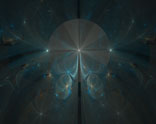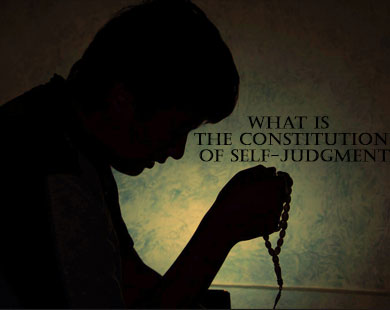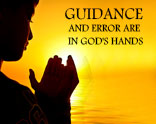The Attributes of the Divine Being
How does the Quran present God?
When we wish to assess the scientific personality and knowledge of a scholar, we examine his works and subject them to close study. Similarly, in order to measure the talent, creativity and ability of an artist to invent original images, we undertake the study of his artistic production.
In the same way, we can perceive the attributes and characteristics of the pure essence of the Creator from the qualities and orderliness that pervade all phenomena, together with their subtlety and precision. Thereby, within the limits set by our capacity to know and perceive, we can become acquainted with God's knowledge, wisdom, life and power.
If it be a question of complete and comprehensive knowledge of God, then, of course, we must accept that man's ability to know does not extend that far. God's characteristics cannot be placed within given limits, and whatever comparison or simile we offer for them is bound to be false, for whatever is observable to science and thought in the natural realm is the work of God and the product of His will and command, whereas His essence is not part of nature and does not belong to the category of created beings. Hence, the essence of the divine being cannot be grasped by man by way of comparison and analogy.
He is, in short, a being for the knowledge of Whose essence no measure or criterion exists and for the fixing of Whose power, authority and knowledge, we have no figures or statistics.
Is man, then, too abject and powerless to perceive anything of the essence and attributes of so elevated a reality? To concede the weakness of our powers and our inability to attain complete, profound and comprehensive knowledge of God does not imply that we are deprived of any form of knowledge, however relative. The orderly pattern of the universe loudly proclaims His attributes to us, and we can deduce the power and unlimited creativity of the Lord from the beauty and value of nature. Phenomena are for us an indication of His unique essence.
Contemplation of the will, consciousness, knowledge and harmony inherent in the order of being and all the various phenomena of life, makes it possible for us to perceive that all these qualities-together with all the other elements that speak of aim, direction and purpose-necessarily derive from the will of a Creator Who Himself possesses these attributes before they are reflected in the mirror of creation.
That which comes to know God and to touch His being is the remarkable power of thought-a flash which derives from that pre-eternal source shone on matter and bestowed on it the capacity of acquiring knowledge and advancing toward truth. It is within this great divine gift that the knowledge of God is manifested.
Islam deals with the knowledge of God in a clear and novel way. The Quran, the fundamental source for learning the worldview of Islam, applies the method of negation and affirmation to this question.
First, it negated, by means of convincing proofs and indications, the existence of false gods, because in approaching the transcendent doctrine of unity, it is necessary first to negate all forms of pseudo-divinity and the worship of other-than-God. This is the first important step on the path to unity.
The Quran says: ﴾Have the ignorant polytheists abandoned the true God and chosen, instead, the false and powerless gods? Tell them: "Bring forth your proof!' This call of mine to unity is my saying and that of all the learned men of the community, as well as the saying of all the Prophets and learned men before me. But these polytheists have no knowledge of the truth and constantly avert themselves from it.﴿(21:24)
﴾Say, O Messenger, 'You worship one other than God who has no power to help or to harm you. It is God Who is all-hearing and Who bows the state of all of creation.﴿(5:79)
The one who has severed his connection with divine unity forgets, too, his own true position with respect to the world and being and becomes estranged from himself. For the ultimate form of self-alienation is the severing of all links with one's essential nature as man. Conversely, once man has become alienated from his own essence, under the influences of internal and external factors, he will also be separated from his God and become enslaved by other-than-God. Subordination to other-than-God, then, takes the place of all logical thought. This represents a reversion to the worship of phenomena, for worshiping an idol and according primacy to matter both are forms of regression that rob man of his innate capacity for growth.
Monotheism is the only force that makes it possible for man to recapture the creativity of human values. By regaining his true rank, he enters a state of harmony with his own human nature and the ultimate nature of all beings, thus attaining the most perfect form of existence open to him.
Throughout history, all divine summons and movements have begun with the proclamation of divine unity and the exclusive lordship of God. No concept has ever occurred to man that is more productive of creative insights and more relevant to the various dimensions of human existence, or a more effective brake on human perversity, than the concept of divine unity.
Using clear proofs, the Quran shows man the way to attaining knowledge of the divine essence as follows: ﴾Did man emerge from non-being through his own devices? Was he his own creator? Did mankind create the heavens and earth? Certainly they do not know God.﴿(52:35-36)
The Quran leaves it to man's reason and common sense to realize the falsity of these two hypotheses-that man came into being of himself, or that he was his own creator-by testing and analyzing them in the laboratory of his thought. By reflecting on the signs and indications of God, he will come to recognize with clear and absolute certainty the true source of all being and to understand that no value can be posited for any model of the universe unless behind it an organizing and capable intellect is at work.
In other verses, man's attention is drawn to the manner of his creation and gradual emergence from non-being. He, thus, comes to realize that his remarkable creation, with all the wonders it contains, is a sign and indication of the infinite divine will, the penetrating rays of which touch all beings.
The Quran says: ﴾We created man out of an essence of clay, then We established him in a firm place in the form of sperm. Then We made the sperm into coagulated blood, and then into a formless lump of flesh. Then we made it into bones, and then clothed the bones with flesh. Finally We brought forth a new creation. How well did God create, the best of all creators!﴿ (23:12-14)
When the fetus is ready to receive shape and form" all the cells of the eyes, the ear, the brain, and the other organs, start to function and begin their ceaseless activity. This is the truth to which the Quran is directing men's attention. It, then, poses to man the question of whether all these wondrous changes are rationally compatible with the hypothesis that there is no God.
Is it not rather the case that phenomena such as these prove and demonstrate" with the utmost emphasis, the need for a plan, a design, a guiding hand inspired by conscious will? Is it at all possible that the cells of the body should learn their functions, pursue their aim in a precise and orderly fashion, and crystallize so miraculously in the world of being, without there being a conscious and powerful being to instruct them?
The Quran answers this question as follows: ﴾He it is Who creates and brings forth (the totality of parts), Who separates (the parts belonging to each organ), and Who gives form (to different aspects).﴿ (59:24)
The Quran describes every sense phenomenon that man sees around him as something calling for reflection and the drawing of conclusions. ﴾Your God is but one God. There is no god other than Him, Compassionate and Merciful In the creation of the heavens and the earth, in the alternation of night and day, in the ships that ply the seas to the benefit of man, in the water sent down from the heavens to revive the earth after its death, in the different species of animals scattered across the earth, in the rotation of the winds, in the clouds that are subordinate to God's command between heaven and earth-in all of this, there are signs for men who use their intellects.﴿(2:163-164) ﴾Tell men to reflect with care and see what things the heavens and the earth contain.﴿(10:10)
The Quran also mentions the study of human history and the peoples of the past with all the changes they have undergone, as a special source of knowledge. It invites man to pay heed, in order to discover the truth, to the triumphs and defeats, the glories and humiliations, the fortune and misfortune, of various ancient peoples, so that by learning the orderly and precise laws of history, he will be able to benefit himself and his society by aligning the history of his own age with those laws.
The Quran thus proclaims: ﴾Even before your time, certain laws and norms were in force, so travel and examine the historical traces left by past peoples, to see what urn the fate of those who denied the truths of revelation and the promises of God.﴿(3:137) ﴾How many were those powerful ones whom We destroyed in their cities on account of their oppression and wrongdoing, and We made another people to be their heirs.﴿(21:11)
The Quran also recognizes man's inner world, which is expressed by the word angus ("souls"), as a source for fruitful reflection and the discovery of truth. It points out its importance as follows: ﴾We make our signs and indications entirely manifest in the world and in the souls and inner beings of Our servants so that it should be clear that God is the True.﴿(41:53) ﴾On the face of the earth there are signs fur the possessors of certainty, and also in your own selves; will you not see?﴿(51:20-21)
In other words, there is an abundant source of knowledge in the beauty and symmetry of the human body, with all of its organs and capacities, its actions and reactions, its precise and subtle mechanisms, its varied energies and instincts, its perceptions, feelings and sensations, both animal and human, and most especially in the astounding capacity of thought and awareness with which man has been entrusted-a capacity which still remains largely unknown, for man has taken only a few steps in studying this invisible power and its relationship with his material body.
The Quran proclaims that it is sufficient to reflect on and examine your own self in order to be guided to the eternal, infinite source that is free of all need, has unlimited knowledge, skill and power, and a feeble reflection of which is manifest in your being. You will then know that it is that infinite reality which has thus brought together in one place such a fruitful compound of elements and brought it forth onto the plain of existence.
Given the existence of such vivid indications and decisive proofs, placed at your disposal and within your own being for you to seek the knowledge of God, no excuse will be accepted from you for misguidance and denial.
The Quran also applies the method of negation and affirmation to the question of God's attributes. Thus, it describes the attributes that the essence of the Creator possesses as "affirmative attributes." Among them are knowledge, power, will, the fact that His existence was not preceded by non-existence and that His being has no beginning, and the fact that all the motions of the world derive from His will and His power.
The Quran says: ﴾He is God, the One other than Whom there is no god, the knower of the hidden and the manifest, the Compassionate, the Merciful. He is God, the One other than Whom there is no god, the Commander, the All-powerful, Pure and Without Defect, the Bestower of Safety, the Protector, the Precious; the Mighty, the Sublime, the Most Elevated. Exempt and purified be He from the partners which they ascribe to Him.﴿(59:22-23)
The "negative attributes" are those from which God is free. They include the fact that God is not a body and has no place; His sacred being has no partner or like; He is not a prisoner to the limitations set up by the bounds of the senses; He neither begets nor is begotten; there is neither change nor motion within His essence, for He is absolute perfection; and He does not delegate the task of creation to anyone.
The Quran says: ﴾O Messenger, say: "He is God, the One, the God Who is free of need for all things and of Whom all beings stand in need. No one is His offspring, and He is not the offspring of anyone, and He has no like or parallel.﴿(12:14) ﴾Pure and exalted is thy Lord, God the Powerful and Unique, Who is pure of what men in their ignorance ascribe to Him.﴿(37:80)
Human logic, which inevitably thinks in terms of limited categories, is incapable of sitting in judgment on divinity, because we must admit that it is impossible to perceive the ultimate ground of that being for whom no observable or comprehensible analogue or parallel exists in the world of creation. The most profound schools of thought and the greatest methods of reflection here fall prey to bewilderment.
Just as all existent beings must lead back to an essence with which existence is identical, to an independent being on which all other beings depend, so, too, they must derive from a source of life, power and knowledge, from the infinite being of which all these attributes and qualities surge forth in abundance.
The Conditions for an Ideal Object of Worship
The Lord of the World, as presented in the Quran, possesses all the necessary conditions of an ideal object of worship. He is the creator of love and all forms of beauty, the originator of all forms of power and energy. He is a vast ocean on the slightest ripple of whose surface the swimmer of the intellect is tossed around like a plaything. It is He Who preserves the heavens from falling and the earth from collapsing. If, for an instant, He closes His eye of mercy or averts it from this world, the whole of the universe will perish and hurtle toward non-being in the form of dust. The existence and survival of every atom in the universe is, therefore, dependent on Him.
It is He Who bestows all bounties and all felicities, Who owns us and may freely dispose of us. When He commands and an order goes forth, as soon as He says, "Be!," a creature comes into being.
Truth and reality derive their substance from His essence, and freedom, justice, and other virtues and perfections derive from the rays of His attributes. To take flight towards Him, seek to draw near to His glorious threshold, is to attain all conceivable desire at the highest degree. Whoever gives his heart to God, gains an affectionate companion and a loving friend; the one who relies upon Him has placed his hope on a firm foundation, while the one who attaches his heart to other-than-God is a prey to illusion and builds a foundation on wind.
He Who is aware of the slightest motion that takes place anywhere in creation can also determine for us a path leading to happiness and lay down a way of life and a system of human relations that conforms to the norms He has established in the order of creation. He is, after all, aware of our true interests, and it is even His right alone to lay down a path for us as the logical outcome and natural consequence of His divinity. To act in accordance with the program He lays down is the only certain guarantee for our ascent toward Him.
How is it possible that man should be so enamored of truth and justice that he is ready to sacrifice his life for their sake, unless he is aware of their source and origin?
If a being is worthy of worship, it cannot be anyone other than the Creator Who is the axis of all beings. No thing and no person has such a rank as to deserve the praise and service of man. All values other than God lack absoluteness and primacy and do not subsist in and of themselves; they are relative and serve only as a means for the attainment of degrees higher than themselves.
The primary qualities that elicit man's worship are being the bestower of all bounties and being aware of all the possibilities, needs, capacities and energies contained in man's body and soul. These qualities belong exclusively to God; all beings stand in need of and rely upon that being Who is existent by virtue of His own essence. The caravan of existence is constantly moving toward Him by means of His aid, and His commands descend unceasingly of every speck in the universe.
Absolute submission and worship belong, then, exclusively to His Most Sacred Essence. His glorious presence, uninterrupted by a single moment of absence, is felt at the heart of each atom of being. All things other than God resemble us in that impotence and deficiency prevail over them. They are, therefore, unworthy of our submission and are not worthy of usurping sovereignty over any part of God's realm, which is the whole broad plain of existence. Man, too, is too noble and valuable a being to be subjected and humbled by anything other than God.
In the whole broad plain of being, it is God alone Who deserves man's praise. Man must grant to his love of God, to his efforts to draw near to Him and earn His pleasure, precedence over all other beings and objects of love. This Will result in the ennobling of man and, the augmenting of his value, for man is but a small drop and if not united with the ocean, he will be swept away by the storm of corruption, dried up by the burning sun of chaos. Man gains his true personality and becomes eternal when he attaches himself to that effluent source, when God gives meaning to his world and becomes the interpreter of all the events of his life. It is in this sense that men's worlds may be either broad and expansive or narrow and constricting.
The Commander of the Faithful, Ali, peace be upon him, says, in discussing the weaknesses of man and his limited capacities: "How strange and remarkable is the affair of man! If he becomes hopeful with regard to a certain desire, greed will render him abject; desire will lead to greed, and greed will destroy him. If he falls prey to hopelessness, grief and sorrow will kill him. If he attains happiness and good fortune, he will fail to preserve them. If he falls prey to terror and fear, they will reduce him to utter confusion. If abundant safety is granted him, he will become negligent If his blessings are restored to him, he will become arrogant and rebellious. If he is stricken with misfortune, sorrow and grief will disgrace him. If he acquires wealth, he will become overweening. If poverty lays hold of him, he will be plunged into misery. If he is weakened by hunger, he will be unable to rise from the ground. If he eats to excess, the pressure of his stomach will discomfort him. So all deficiency in the life of man is harmful, and all excess leads to corruption and ruin."1
Generally speaking, justice, nobility, virtue and other qualities that earn respect and praise must either be illusionary and imaginary, or we must consider these values as real and necessary, based on the perceptions of conscience and instinct. In the latter case, we ought humbly to submit to that universal existence and absolute perfection which flows over with virtue, life and power, and from which all values derive.
When we look into the matter carefully, we see that all the countless beings that exist in the world, as well as the love and aspirations that are rooted in the depths of our being, all converge at one point, all revert to one source-God. The very essence and reality of the world is identical with its connection, relation and attachment to God. Being reascends by a different route to the point where it began and from which it descended, and that point alone is worthy of man's love and devotion. Once man discovers this point, he becomes so enamored of its absolute beauty and perfection that he forgets all else.
We see that all phenomena have emerged from non-being into a state of being, and that throughout the period of their existence, whether short or long, they are dependent on a source external to themselves for aid and sustenance; they are marked indelibly with subordination and lack of autonomy.
If the ideal object of worship we seek and toward which we are attempting to advance were unaware of the pains we suffer and the nature of the world; if it were unable to satisfy our desires and longings, being replete with impotence and deficiency just like ourselves and belonging to the same category as us-it could not possibly be our final aim and ultimate object or possess absolute value.
When we seek the fulfillment of a wish by means of our worship, it is God alone Who can respond by meeting our needs. The Quran says: ﴾Those whom you call upon other than God are servants like yourselves (i.e., they have no power of themselves).﴿(7:194)
The Commander of the Faithful, upon whom be peace, while supplicating his Lord in the mosque of Kufa, said: "O my Master, O my Master! You are God the Great and I am your wretched and insignificant slave.




















